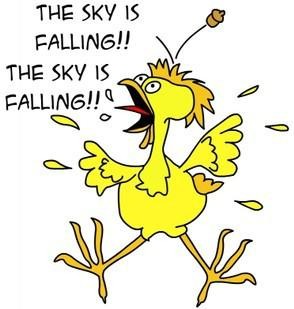The fearful cries are all around us. “The end of Christianity is imminent! Soon the American church will survive only underground!” “Moral degradation is eroding all decency!” “American freedom will soon be no more than a distant memory.”

[uncredited image from http://www.terryburnham.com/2016/01/chicken-little-portfolio-performance_29.html]
Or, more succinctly, “The sky is falling.”
The sky, it seems, is always falling. Fear is such a powerful, and useful, motivator.
According to historian John Fea, evangelicals cast their votes in recent elections motivated by fear. More broadly, it is fear that has lead some Christians to make rules (such as “Don’t dance!”) to protect against the possibility of sin. It is fear that leads some to create fortresses or to demonize their neighbors. Fear leads some to be intolerant of those different lest they or their children or their churches be corrupted by those differences. Fear of losing otherwise good things like freedom and money turns these things into idols to be protected at all costs. Fear becomes the leash that a charismatic leader uses to retain access to the contributions and devotion of his followers.
Fear is powerful and ubiquitous. And though it is effectively used by all sides in social and political disputes, I’m concerned most when it is used so effectively among those who have the least cause to fear. And Christians, we have the least cause to fear.
I was reminded that the sky is always falling when I read this paragraph a few months ago.
“America and the rest of Western culture now seem to be more on the edge of dissolution than on the point of renewal.… The situation in this country seems to call for a jeremiad, not a celebration.… Race prejudice, latent under the surface of political campaigns, seems intensified by our very efforts to correct it. The crime rate is outstripping police restraint and turning private surveillance into a growth sector. Pornography and violence fill the media, and a host of other social problems run in counterpoint with an uncertain economy.”
That which could have been written yesterday was actually written in 1975 (by Richard Lovelace in his Dynamics of Spiritual Life.) Lovelace was not panicked or seeking to induce panic. But his observation simply illustrates that the sky that is falling now was falling 40 years ago (and centuries before that as well, in different ways).
To know that the culture can always seem to be in some ways on the verge of collapse should temper our response to the news of the day. Problems have been met before. They will be met again. Fear should not be our guide nor should we follow a leader just because he/she promises to keep the falling sky at bay. Our response to issues, which certainly should be vigorous and based upon an accurate assessment of reality, can afford to be thoughtful because the difficulties are not really new. Panic leads us to be hasty. Christians should not be hasty.
Christians can afford to be un-hasty because they know the one who upholds that falling sky. It is not inconsequential that ‘Do not fear’ is one of the most repeated refrains of the Bible. Preachers should make more of this, and of the power and ways and faithfulness of God, and less of the symptoms of the falling sky. Fear drives us into the arms of the demagogue and the false messiah. Eyes cast upon the living God, on the other hand, grow in confidence and perspective. And courage.
Yes, the sky is probably always falling. But those who “…believe in one God, the Father Almighty, Maker of heaven and earth, of all things visible and invisible….” should be the last to be motivated by fear.

 Among the many things I might say, that sentence is one which could probably get the most universal affirmation. Bad stuff has happened. The year that is past seemed to feed us an over-the-top diet of death and violence and loss and disappointment. I have seen many online express a longing for this year to be gone, a longing I sincerely get.
Among the many things I might say, that sentence is one which could probably get the most universal affirmation. Bad stuff has happened. The year that is past seemed to feed us an over-the-top diet of death and violence and loss and disappointment. I have seen many online express a longing for this year to be gone, a longing I sincerely get.